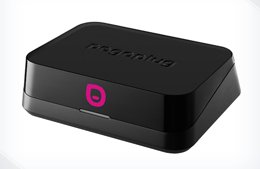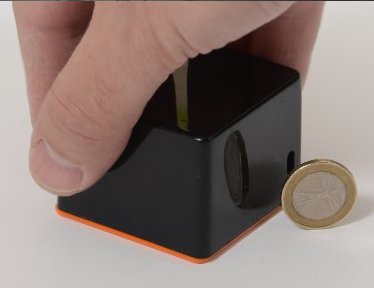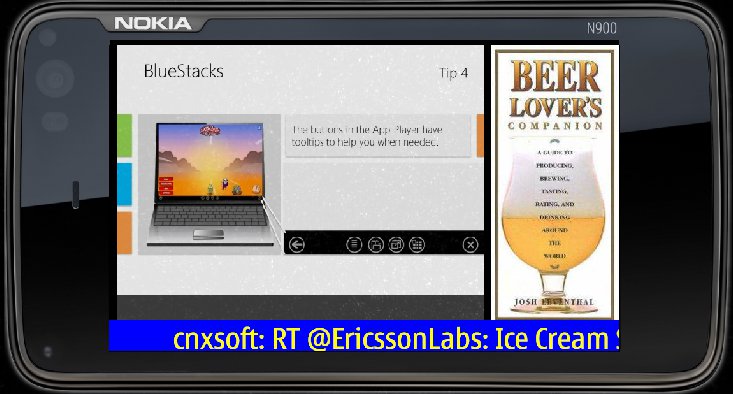One month after launching Pogoplug Cloud, Pogoplug announces the Pogoplug Series 4, a new version of Pogoplug that adds more local storage options, including two USB 3.0 ports and a SATA/USM port. The device is based on Marvell 88F6192 chip with ARM V5 CPU clocked at 800Mhz with 128 RAM and runs Linux. Pogoplug Cloud service gives 5GB of free online cloud storage optimized for mobile phones and tablets, and you can greatly expand this by connecting a hard disk or SSD to Pogoplug Series 4. Pogoplug also plans to offer premium account with 50 and 100 GB of cloud storage. Key Pogoplug features include: Storage: Automatically upload photos and videos from your mobile device to Pogoplug Cloud. Sharing: Instantly share anything in your cloud through email, Facebook, Twitter and Google+. Create shared folders to collaborate with friends and colleagues. Streaming: Stream HD videos, photos and music from Pogoplug Cloud to your phone. […]
Archos 80/101 G9 Firmware Version 3.2.77 Released
Archos has just released a new firmware for Archos 80 G9 / 101 G9 and A70B. Here’s the changelog: Version 3.2.77 – December 6th, 2011 Google apps: new Honeycomb release 6 integrated. It fixes Video GTalk crash when switching cameras on devices with only one camera. Now Google+ is part of the firmware. Archos media server: allow connected TVs to play video from your tablet via network Network shortcuts: it is now possible to create network shortcuts in file/music/video browsers Accessories: external USB audio cards (DAC) support has been added Media center: a new progress bar slider indicates resume position on videos already played Media center: in regular list view, the title of the TV show episode is appended after the season and episode numbers File manager: support of zip files Music: fix repeat mode Audio: decrease loud volume glitches on notifications while playing music Media database: remove muSD card […]
Solid-Run CuBox: Open Source Platform for Android TV, Media Center and NAS Development
Solid-Run CuBox is a miniature open source development platform based on Marvell Armada 510 SoC (88AP510) and aimed at applications such as multimedia, set-top-box, network attached storage (NAS), thin client, digital signage, automation… CuBox measures 55mm x 55mm x 42mm (so it’s not a Cube) and consuming less than 3 watts. The device runs Android 2.2 or Linux 2.6 on an 800MHz Marvell Armada 510 CPU (ARMv7 architecture) with 1GB of DDR3 memory and a microSD slot. It also includes eSATA, USB, infrared, S/PDIF, HDMI and gigabit Ethernet interfaces. CuBox Developer Platform includes the following key features – Marvell Armada 510 SoC – 800 MHz dual issue ARM PJ4 processor, VFPv3, wmmx SIMD and 512KB L2 cache. 1GByte DDR3 at 800MHz 1080p Video Decode Engine OpenGL ES 2.0 graphic engine HDMI 1080p Output (with CEC function) Gigabit Ethernet, SPDIF (optical audio), eSata 3Gbps, 2xUSB 2.0, micro-SD, micro-USB (console) Standard Infra-red receiver […]
99 USD MIPS Android 4.0 Tablet Hands-on Video
Following the announcement of the 99 dollars Ainol Novo 7 Android ICS last week, MIPS’s Amit Rohatgi, Mobile Principal Architect at MIPS released a longer demo video of the device, showcasing the following: Angry Bird Game with framerate around 50 FPS. Kindle Reader Web Browser Rear & Front Camera Photo Gallery (transition are a little sluggish) Email (Exchange account) 1080p video playback both an the device and mirroring on HDTV via an HDMI cable He also explain that on of this friends could watch 3 full-length movies on a battery charge. Jean-Luc Aufranc (CNXSoft)Jean-Luc started CNX Software in 2010 as a part-time endeavor, before quitting his job as a software engineering manager, and starting to write daily news, and reviews full time later in 2011. www.cnx-software.com
Adding a Project to Gitorious with a Windows Computer
If you are developing software in Windows XP, Windows Vista or Windows 7, here are the steps to follow to push your project to Gitorious. Register and create a new project on Gitorious, if you haven’t done already. Install msysGit to have git on your Windows machine Click on “Git Bash” to start the command line Generate the SSH Key with “ssh-keygen -t rsa” and press ‘Return’ in every question. Go to your Gitorious dashboard, click on “Manage SSH Keys” then “Add SSH Key“, copy the content of “cat ~/.ssh/id_rsa.pub” in Gitorious and click save Then go to your local project directory and follow the “getting started instructions” given in Gitorious, which should look like: git config –global user.name “Your Name” git config –global user.email “[email protected]” git checkout master git remote add origin [email protected]:your-project/your-project.git git push origin master Then wait until the code is pushed to the Gitorious server. If […]
Qt Quick QML Digital Signage Demo Part 2
Following up on Qt Quick QML Digital Signage Demo Part 1, I’ve updated the digital signage demo to support the following: Play 5 videos in a loop Display 5 pictures in a loop where the picture is changed every 5 seconds Use a (twitter) RSS feed for the scrolling text I initially planned to use QML to list the media files, but it is apparently not possible without using C/C++ and I may do it later on. So instead, I hard-coded the video and picture playlists in the QML files with the ListModel element. Videos are located in the video directory and pictures in the pic folder. An index is needed to scroll thru the playlist, but QML does not support global variables, so I created a JavaScript file (globals.js) to store the video and picture index: // Global variables in JavaScript file var iVideoIndex = 0 var iPicIndex = […]
Design West Summit – 26-29 March 2012
UBM Design announced the schedule and pass pricing for Design West Summit (previously Embedded System Conference) which will now bring 7 summits in one location (San Jose McEnery Convention Center) on 26-29 March 2012: Embedded Systems Conference & Exhibition – Conference Dates: March 26 – 29, 2012. Exhibition Dates: March 27-29, 2012. (See Details below) Android Summit – March 28, 2012 – Everything Android from embedded design to Apps development. Android Certification Program Android Speed Training Android Fundamentals Course on the Expo Floor Android Conference Program Multicore DevCon– March 27 & 28, 2012 – Embedded multicore and multimedia. 7th annual Multicore Conference Courses Multicore Expo Floor Zone Multicore Fundementals Courses Keynote Addresses Industry Addresses Expo floor parties and giveaways BlackHat – March 29, 2012 – One-day conference focused on security in embedded systems. Security Fundementals Course Black Hat Summit Conference Courses Security focused presentations in the expo floor theater Keynotes […]
5th Linux BSP Release for Snowball Development Board
Igloo Community – the team developing for ST Ericsson Snowball Nova A9500 development board – has released the fifth version of the Linux BSP for the board and this version nearly fully support all features of the board. It can be downloaded at http://igloocommunity.org/download/linaro/images/20111209/. ChangeLog since last release: Based on Linaro Ubuntu 11.11 desktop filesystem Accelerometer and barometer support for all board revisions GPS support Enhancements to the default kernel config (NFS, /proc/config.gz support) Enhanced display support Add support for new connectivity module versions Main supported features: Based on Linux 3.0.0 and the Linaro Ubuntu desktop file system HDMI/DVI-D display support Graphics acceleration with the Mali 400 GPU Bluetooth support GPS support Ethernet and Wireless connectivity microSD card support Sensors (accelerometer, magnetometer, gyroscope, barometer) Limited USB OTG host functionality Features to be included in future releases: Multimedia acceleration Better USB OTG host support Known issues: USB OTG host mode is […]







